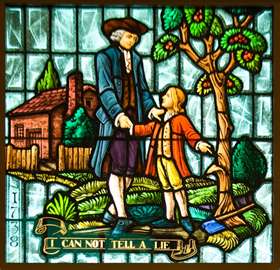 We have this tendency in America to fictionalize the stories of our founders in order to create a shorthand understanding of their great accomplishments.
We have this tendency in America to fictionalize the stories of our founders in order to create a shorthand understanding of their great accomplishments.
George Washington certainly told a lie, but it inspires us to believe that the Founding Fathers were cut from divine cloth.
This has been on my mind as I read positions regarding gun control in the wake of Texas, Michigan, Ohio, Florida, Nevada, California, Oregon, Connecticut, Colorado, Wisconsin, Nebraska, Virginia, and Alabama… As anti gun-control activists apply the protection of the Second Amendment they often embellish the authors with a clairvoyance above mere mortals.
But mortals they were…
They were not mystics and wizards and could not imagine the technologies that would emerge from their infant nation. In their time a “well regulated militia” (of farmer-soldiers) was necessary to supplement the national army to protect the sovereignty of our nation against foreign invasion. It was inconceivable at the time that a militia would ever become irrelevant.
And so having, at the ready, armed citizens to protect their young and vulnerable country from an invading army was logical. They included, therefore, a prefatory clause in their Second Amendment: “A well-regulated militia, being necessary to the security of a free state….”
After the massacre in Orlando, four bills regarding background checks and FBI authority went before the Senate (two Republican-drafted bills and two Democratic bills). All four were struck down.
Iowa Senator Joni Ernst supported Iowa Senator Charles Grassley’s amendment in 2019 to improve the National Instant Criminal Background Check System and to give the FBI three days to investigate an individual to confirm or rule out links to terrorism (if evidence is found, the FBI could seek a warrant from a judge to prevent the transfer of a gun to that individual), but that appeared as smoke and mirrors to Democrats who saw it as too weak with too many constraints to make a difference.
Today, however, after the school massacre in Texas, a bipartisan proposal will go to the senate that would make juvenile records available during background checks whenever someone under the age of 21 buys a gun. The proposal will also ban convicted domestic abusers from being able to buy a gun and send federal funding to states enacting red flag laws, which attempt to take guns away from individuals considered potentially violent.
The concern of Republicans continues to be the defense of due process and to not subjugate law-abiding citizens to unlawful restrictions regarding the purchase of guns. Ernst regarded Grassley’s previously proposed amendment as a “reasonable solution … without unlawfully infringing on law-abiding U.S. citizens’ Second Amendment rights.”
A central argument that needs to be understood is not even being raised. Or, if it is, it is so divisive it simply cannot be resolved. And that is: What are those Second Amendment rights? How far do they extend? Do they include weapons designed for the military?
I asked a friend who disagrees with me on the issue of gun control and he said: “There can be no restrictions. The Second Amendment says ‘arms’ which includes anything.”
He continued: “I’m not saying people can have rocket launchers and bazookas, but anything they can carry on their person for protection or hunting.”
“What if firearm technology,” I asked, “develops a personal, mini-missile launcher that fits neatly onto your forearm? As easy to conceal as most handguns. Is that now fair game to own?”
“You’re being ridiculous.”
“No, I’m not. That is no more of a stretch from today’s weaponry than a semi-automatic rifle is from a single shot musket. You know…the ‘arms’ that were understood in the Second Amendment.”
Personally, I cannot see how military weaponry is protected by the “right to bear arms” within our domestic universe.
Dissatisfied, I did some investigation into the psychology (such as what this article addressed in the beginning) of writing narratives to fit conclusions. Particularly: Why do gun owners associate the unlikely event of needing a gun with the need to own a gun?
Andrew Walden writing for “Health Research Policy” addresses irrational responses to rational fears. Neurological pathways are created. Just as folks in Nebraska started locking their doors after 9/11, it is an irrational response to what appears as a rational fear. They feel that personal assault weaponry is appropriate protection, even though that threat has a near-zero probability. And since Isis or al-Qaeda haven’t actually attacked North Platte, it reinforces in their mind that their actions are causally related to that fact.
They can associate gun ownership with safety, even though the opposite is more likely to be true. Gun ownership increases the probabilities of a number of negative events (e.g., your spouse shoots you; you accidently shoot yourself; you shoot the pizza delivery guy because you didn’t know your son ordered Dominoes at midnight). The chance of you chasing away a would-be killer with your AR 15- almost zero.
What can statistics tell us about the relationship between guns and safety?
Americans own over 300 million firearms. 35% of our private residences own at least one gun. According to a survey conducted by the Archive of Pediatric and Adolescent Medicine, 40% of the children in these homes know where the guns are stored and 20% have handled the guns without adult supervision or even knowledge of the handling.

Emory University conducted a study that determined that the likelihood of a murder occurring in homes that have guns nearly triples. 77% of those killed in their homes were murdered by someone they knew with no signs of forced entry, whereas, strangers account for less than 4% of the murders.
These are pretty numbing statistics and contradict the notion of the NRA and most gun supporters, who oppose gun laws, saying that carrying a firearm provides greater safety.
In the aftermath of the Arizona shooting at an outdoor shopping mall, several years back, I was in a conversation with a couple of friends who were of the opinion that if “people had been armed this tragedy would not have gone as far as it did.”
“Really?” I asked. “If more people, without police or military training, were packing heat you think the violence would have been better contained?”
My point here is not to limit responsible Americans from owning guns or to inhibit our hunters from their pursuits, but to lessen the chances of people who are criminally inclined or unstable from the easy access they find today.
And to demand accountability from somewhere for an epidemic of assassinations that extends to every seemingly tranquil corner of our nation.
Here’s what a coalition of 550 US mayors have asked for:
#1 — Fix the Holes in the Background Database: Existing laws already outlaw criminals, drug abusers, the mentally ill, and other dangerous people from passing a background check. The problem is state and federal agencies aren’t required by law or funded by Congress to supply that information to the background check system and possibly as many as one million prohibited purchasers are missing from the background database.
A new law would create full funding and necessary incentives for states and federal agencies to comply with reporting requirements and make sure every legally prohibited purchaser is included in the background check database.
#2 — Sell No Gun Without a Check: Under the current system, even if a Prohibited Purchaser like the Virginia Tech or Tucson shooters would fail a background check, they could still have walked into any gun show and bought a car load of guns with no background check, no questions asked. A new law would close all of the loopholes and require background checks for every gun sale, with reasonable exceptions for law enforcement and certain gun permit holders.
A gun is a single function mechanism designed to kill and while the pro-gun lobby likes to use catchy phrases like, “Guns don’t kill, people do” as if to imply that a gun is a harmless lump of metal without a human pulling the trigger, they belie the issue.
Cars don’t run stoplights by themselves and they don’t drink alcohol either, people do, but we enforce safety laws and revoke licenses when vehicle safety is abused. We wouldn’t let a teenager drive a car before learning how because a vehicle is a potentially deadly force in incapable hands, so why are we lax on gun control and allow people who have not shown that they know how to use a gun to purchase one?
Which, invariably, brings us back to the Second Amendment….
After many drafts, it was finally worded and ratified within the Bill of Rights in 1791 thusly- A well regulated militia being necessary to the security of a free State, the right of the People to keep and bear arms shall not be infringed.
There is no question that this amendment was a safeguard relevant to its time, but state militias of farmer/soldiers are no longer the best application of force to protect our interests; our national military quickly evolved to serve that purpose. Our military is now so powerful that it is only a cinematic-Patrick Swayze-fantasy that believes armed citizens can protect our sovereignty.
armed citizens can protect our sovereignty.
The Constitution is a living document conceived by a diverse collection of men who put their best ideas forward to design a charter that realistically interprets the times. The role of firearms and part of the original intent of the Second Amendment has changed dramatically. Just as Civil Rights have been more clearly and accurately defined over time and the Bill of Rights has grown to reflect our new enlightenments, so must our understanding and application of the use of personal lethal force.
There are no “rights” without restrictions.
Even the First Amendment comes with parameters to contain its reckless exercise; you cannot defame or harm someone’s reputation by libel or slander. Just yell “Fire!” in a crowded movie theater and see how quickly your “freedom of speech” is curtailed. The same is true of the Second Amendment. You may have the “right to bear arms” but not any way, anywhere, anytime you wish.
“The right of the People to keep and bear arms shall not be infringed” but when that declaration infringes on my family when we’re strolling through the mall or when my children are in SCHOOL, I will support legislation that demands responsibility from those who wish to exercise that right.
Now…who’s on First?
